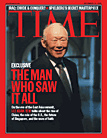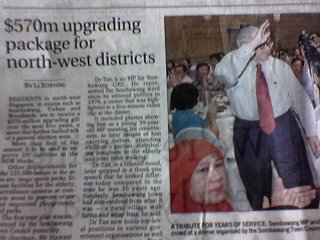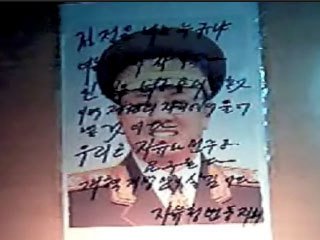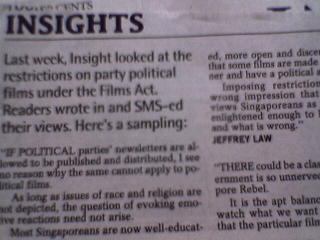The credo for Singapore's art and media.
No sensationalising, no crusading journalism, no partisan reporting, no comments on race and religion, no biased political films. Bottomline - no stirring up of unnecesary emotions. Emotions, if left unfettered, are irrational, undesirable and detrimental to nation building. Singaporeans know better than to get angry over charity scandals, feel compassion for tsunami victims, get teary-eyed over rainy national day parades, cry over Separation from Malaysia or cast a vote based on emotions.
And hence, please do not ask Singaporeans to think about what condemned prisoner number 856, aka Nguyen Tuong Van, is going through on death-row in Changi Prison. We have been conditioned to check our emotions, to keep consciences at bay, lest they snowball and actually cause governments to crack.
We do not even carry Nguyen's case on the home section of our newspapers. It is Australia's problem, not ours.
Even when Nguyen's coffin reaches Melbourne five days from now to a firestorm of outrage, Singaporeans will still go about their lives. Many will wonder why their Australian friends are beginning to get emotional and start boycotting Singapore companies.
It's just one less drug trafficker, we will say. A statistic. A digit. A 856.
Where art schools censor their artists

Over the weekend, The Australian newspaper was threatened with legal action by Lasalle directors if it published a picture of the work and all requests for an interview with the artist were denied. The card carrying Van's execution number was hastily removed.
Where the executioner and the executed are supposed to be faceless.
Job vacancy now open for hangman - $400 per kill

Singapore Prisons Department has sacked its only hangman Darshan Singh after his picture was published by the Australian press. Mr Singh said he was in big trouble and was out of a job.
"It has been very, very difficult for me," he told The Sunday Telegraph. "I am not the hangman anymore."
Mr Singh said he would miss the $400 fee for each execution but was relieved he would not be placing the noose around Nguyen's neck. "In a way I am happy," he said.
No glorifying the dead please
The Singapore police slapped a ban on the use of Shanmugam's face in all publicity and information material pertaining to a May 13th concert against the death penalty.
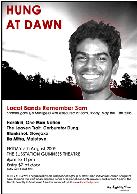

Is it not the job of journalists, writers, bloggers, podcasters, photographers, filmmakers and artists to humanise their subjects?
Those who fear human emotions most are most likely the ones who are most afraid to confront their own, and hence they legislate laws to suppress others' rights to feel and act.
______________________________________________________________________________
Some of the more sobering articles not found in Singapore's media.

His first overseas trip ends by execution in Changi gallows
From Herald Sun
Nguyen's walk to death

IT was through this gate that Tuong Van Nguyen's journey to hell began.
And as he sits on death row awaiting execution on Friday, Nguyen has no doubt reflected on the night the "beep" of the metal detector signalled the collapse of his world.
It was just on three years ago when the 22-year-old Melbourne salesman approached Gate C22 at Singapore's Changi Airport with much trepidation.
He was carrying two bags of high-grade heroin -- one strapped to his body and the other stuffed into a backpack -- and was rushing to catch the flight to Melbourne.
He was in transit from Cambodia, where he'd collected almost 400g of the white powder to smuggle into Australia for a Sydney syndicate.
Nguyen would later tell Singaporean police he had become a drug mule to pay off his twin brother's debts.
Airport security officers in Cambodia had failed to detect the two plastic packets of heroin he'd taped to his body.
Once on the Silkair flight MI622, Nguyen started to have breathing problems, so he went to the toilet and removed the packet taped to his stomach, then stuffed it in his hand luggage. He kept the other taped to his lower back.
After arriving in Singapore, Nguyen had to connect with Qantas QF 10 for his flight home.
But he fell asleep in the Business Lounge, and when he awoke realised he had only 10 minutes to make the plane.
In his police statement, Nguyen said his anxiety levels were further raised by fears that his movements were being monitored by the drug syndicate.
"At the metal detector, I placed my backpack and my business bag on to the X-ray machine," he stated.
"Then I walked through the metal detector and as I was crossing it beeped.
"At that point I knew I was going to be caught.
"A policewoman told me to stand to one side so as not to obstruct traffic.
"She then used a metal detector wand to search me by going up and down my body. The wand did not beep.
"She then touched my back and when she reached my lower back, she must have discovered the packet of heroin strapped there."
Nguyen, who has no criminal record, was immediately taken to a room where he was ordered to place his hands against the wall.
"I told him, 'No need, I will get it for you'," he stated. "I lifted up my shirt and pulled out the strapped packet on my lower back and gave it to the officer.
"He asked me what that was and I replied to him, 'It's heroin, sir'.
"I also told him that there was more and went and retrieved the pack of heroin which I had hidden inside my backpack."
At this stage, Nguyen became distressed and began to cry, at the same time hitting his head against the wall. He then sat on the floor, holding his head in his hands.
Shortly before midnight, December 12, he was taken to Singapore's Central Narcotic's Bureau and later charged on serious drug offences, with an automatic penalty of death by hanging.
It had been his first overseas trip.
Just before midnight last night all was quiet at Gate C22. About 5km away, the lights were also out at Changi Prison.
Nguyen's execution date falls on the third anniversary of the day he flew out of Australia.
From The Bulletin
Singapore deadly serious
... From mule to death row Nearly three years on, Van has, like many others on death row, turned to religion for comfort. He has been baptised and has spent much of his time comforting other condemned prisoners. He has written letters to his closest friends in Australia, reassuring them that "everything will be all right".
Of course, it won't.
His mother is bereft, about to set off on a journey no mother should have to make. Her other boy, who has been a virtual recluse since the arrest, is also making the trip to Singapore.
Kim Nguyen has said little publicly until the past few weeks. Her English is poor and her pain unimaginable. But everyone in Australia understood when she said: "Every time I go to see Van, I tell him mummy loves him very much. He is my heart. If something happens to my son, my heart will be stopped."

______________________________________________________________________________
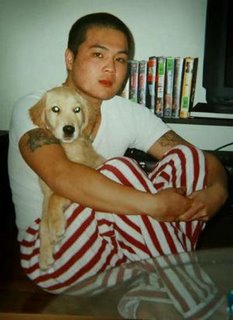
From
The Sunday Mail
COFFEE, TAKEAWAY FOOD AND A FASHION SHOOT TO FILL FINAL
HOURS
By CLARE MASTERS in Singapore
AS THE clock hits 6pm on Thursday, Tuong Van Nguyen will press his hands against the prison's glass window and say his last goodbyes to his mother and brother.
This is the last hour that Nguyen is allowed contact with the outside world.
His lawyers and family will then be ushered out of Singapore's Changi prison, a newly built hi-tech fortress where Nguyen will spend his last days.
It is an institution stiff with regulation and ritual but tradition dictates that the rules relax in the last week of a condemned prisoner's life.
The 25-year-old, who once had another life as a sales man, will be allocated a small
amount of money by the Singapore Government to spend on food and will be able to
order ready-made meals or takeaway, usually shared with the other inmates.
One luxury is a giant cup of coffee in a plastic mug that he will be given in the morning and will sip slowly over the day, holding on to it long after it has gone cold.
On the last day, Nguyen's regimented routine breaks when he is escorted from his tiny cell to a room where he has his photograph professionally taken as a memento for his family.
In a bizarre prison custom reserved for all death-row prisoners, the Vietnamese
refugee will slip out of the orange shorts the con demned are required to wear and the white shirt stamped with his prisoner number C856.
Newly dressed in his favourite clothes, brought to the prison by his mother, Nguyen will face the camera's flash and attempt a smile as he leans against a wall and strikes 13 different poses.
In the grief-stricken days after his broken body is returned to his family, Nguyen's mother will be given the 13 photographs as a gift from the government which killed her son.
As Nguyen treads the floor of his 3m by 2m cell, the prison of ficials will practise his execution with a sandbag of his weight. Nguyen is allowed to read censored newspapers and watch a delayed telecast of Channel Five, Singapore's English-speaking channel.
And, as night becomes Friday morning and the clock's hands reach six o'clock, Nguyen will be taken from his cell one last time to the gallows.
Then he will fall through the trapdoor and become the first Australian citizen to lose his life behind Singapore bars.
__________________________________________________________________
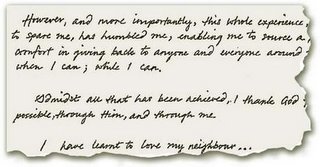 An excerpt of a letter written by convicted drug smuggler Nguyen Tuong Van.
An excerpt of a letter written by convicted drug smuggler Nguyen Tuong Van.
In a second, more formal letter sent to the Singapore President pleading for a reprieve and signed Caleb, the name he has taken since being baptised, Nguyen claims he is beginning to learn the meaning of life.
"Recognising and understanding my offence, the ramifications and subsequent repercussions as a result of my callousness has been crucial, essentially the turning point for my remorseful transformation; an opportunity of self-discovery made possible upon my conception of God and Jesus Christ into my life," Nguyen writes.
"Amidst these score of painful revelations an unspoken truth was exposed. I found myself in deep sorrow for the true victims; the families of those whom suffer as a result of losing a loved one to drugs. This truth has put many things in perspective for me."
In another letter, written on Sunday, October 23 - after his clemency plea was rejected and he was told he had only days to live - Nguyen said he was not surprised. He was sad for his mother and twin brother Khoa and all his loved ones. But he had known this was his fate for a long time. "Sailo (a name he uses for himself in the third person) was just awaiting my day of judgement and I am glad and ready to go now. I believe by then God's purpose will have been achieved.
"Fear has yet to set in and (I) pray may God's strength in me be enough to ward off any doubts I may have."
Nguyen said he went through his normal routine in prison after being told of his looming execution and slept from 7pm to 7am.
"So 12 solid hours ... did me a world of good. This (letter) gonna be short because Sailo's got quite a number of comfort letters to write.
"God blessed me with so many beautiful beings who have loved me unconditionally so it's only befitting I write to and console each one."
Chaplain to give last rites
Father Gregoire Van Giang, a Singapore prison chaplain who assists Nguyen and other inmates, will join the former Melbourne schoolboy in prayers and walk with him from his cell to meet the hangman.
___________________________________________________

From
the Bulletin
In Cold Blood
Singapore proudly say it has "humanised" the hanging process - weighing the condemned and carefully calibrating bodyweight with a "drop" system so as to deliver a swift, clean kill when the platform gives way.
Ravi says Malaysian drug addict Vigmes Murthi wasn't so lucky. When he was hanged at Changi in September 2003, Ravi says, his head was nearly torn off by the force of the 500kg-plus drop, about seven times his bodyweight. "They got it horribly wrong," Ravi says, "his mother was screaming, screaming ... there was so much blood in the coffin, it was overflowing."
By 1pm, the family - delayed coming in from Malaysia - hadn't yet collected the corpse so Singapore summoned the state cremator to dispose of it. The family got there by 2pm and Ravi was called from chambers to have a most unseemly brawl over Vigmes' bloodied corpse with the contracted cremator, who was banking on a nice little earner. In the end, Ravi and Vigmes' family prevailed, "but with no help from the government".
By this year, Ravi says, the famous Singaporean efficiency corrected itself; too much so. On May 13, Singapore's only hangman, a corpulent 72-year-old locally born Indian called Darshan Singh, roused another Ravi client, Shanmugam Murugesu, convicted in 2003 of trafficking 1kg of cannabis, at 2am on the morning of his execution.
In a procedure that awaits Nguyen, he was served a light breakfast before being led to the gallows chamber where he waited and waited - "and one can only imagine his torment", says Ravi - until dawn to die.
Two days earlier, Ravi says, after asking Shanmugam's mother to send in her boy's best clothes, the state had taken him from his cell and photographed him in 14 different poses, including one seated behind a desk. "He looked as if he was the general manager of a big company," says Ravi.
The photo set was presented to Shanmugam's mother by the state after it had killed him, Ravi says, suggesting she might wish to hang the picture of him in his suit in the family living room "as a memento of the potential of her boy". In Singapore, it seems, death comes with interior design advice.
__________________________________________________________
From TVNZ
Nguyen counts down final days
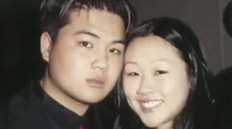
Lex Lasry, Nguyen's counsel, told reporters the former salesman was "calm", composed" and "rational" after seeing him for two-and-a-half hours last week.
Nguyen was "obviously preparing himself for the end of his life, which I must say takes my breath away," Lasry said.
Subhas agrees that those staring death in the face after years on death row can show immense fortitude.
"Most of them have accepted their fate. You'll find that most of them have developed religious (feelings)," he says.
"I've gone to see many of my clients who are going to hang the next day or the day after. They are very philosophical about it.
"Of course you feel that this guy is going to die in two days, but you get used to it I suppose," Subhas said.
It's a long-standing tradition that executions take place at 6am on Fridays.
The gallows are positioned just a short walk from Nguyen's small cell on death row.
He will be handcuffed as he is led to his death.
________________________________________________________________

Mother of Nguyen Tuong Van arriving with twin brother Khoa in Changi Airport
From The Sunday Mail
I'm ready to meet angels: NguyenAfter Nguyen was sentenced to death in March 2004, he told how he desperately missed his brother and mother.
"The pain of missing her is by far sharper than anything physical I have ever felt," he wrote.
"With aching comprehension, I come to terms with the loss I feel without mum."
Nguyen, who is popular among other inmates, told of how he planned to keep the news of his looming execution from his friends inside, to spare them from anguish.
"I was gonna keep it from the guys in here so as to spare them, but I made second page of the newspaper so there went my surprise," he wrote.
God and faith are common themes in his writing.
In a letter to a friend, written before his clemency was rejected, he writes: "The
hidden providence of God – your undying support has gone a long way in keeping my pilot light burning; esp. during my darkest moments."
_________________________________________________________________
Preparations for death
Every religious tradition emphasizes that to prepare spiritually for death it is vital that we establish right now a daily spiritual practice, a practice so deeply ingrained that it becomes part of our flesh and bones, our reflexive response to every situation in life, including our experiences of suffering.
Making a connection, healing relationships and letting go. This task refers to our relationships with others, particularly family and friends. The main points here are to learn to communicate honestly, compassionately and unselfishly, and to resolve any unresolved problems we may have with others.
Nguyen's families and friends should be saying their goodbyes in the next two days. All news of attempts to seek a stay of his execution should not reach him. It is best for Nguyen that he mentally steadies himself to depart, in the words of sacked hangman Darshan Singh, "to a world better than this."
It will be difficult - as hanging will not be painless and instantaneous. Nguyen will feel tremendous pain. Let's pray that when the trapdoor opens and the noose tightens, he finds the composure to not struggle, and just let go.
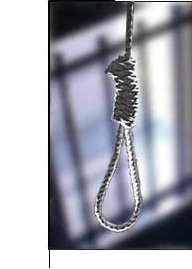
Hanging
For execution by this method, the inmate may be weighed the day before the execution, and a rehearsal is done using a sandbag of the same weight as the prisoner. This is to determine the length of 'drop' necessary to ensure a quick death. If the rope is too long, the inmate could be decapitated, and if it is too short, the strangulation could take as long as 45 minutes. The rope, which should be 3/4-inch to 1 1/4-inch in diameter, must be boiled and stretched to eliminate spring or coiling. The knot should be lubricated with wax or soap "to ensure a smooth sliding action," according to the 1969 U.S. Army manual. (The Corrections Professional, 1996 and Hillman, 1992)
Immediately before the execution, the prisoner's hands and legs are secured, he or she is blindfolded, and the noose is placed around the neck, with the knot behind the left ear. The execution takes place when a trap-door is opened and the prisoner falls through. The prisoner's weight should cause a rapid fracture-dislocation of the neck. However, instantaneous death rarely occurs. (Weisberg, 1991)
If the inmate has strong neck muscles, is very light, if the 'drop' is too short, or the noose has been wrongly positioned, the fracture-dislocation is not rapid and death results from slow asphyxiation. If this occurs the face becomes engorged, the tongue protrudes, the eyes pop, the body defecates, and violent movements of the limbs occur. (The Corrections Professional, 1996 and Weisberg, 1991)
